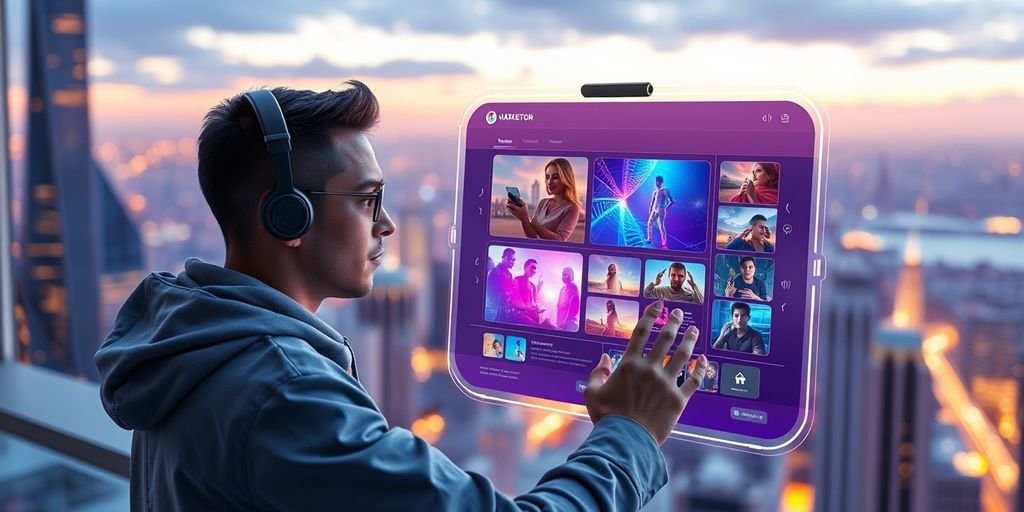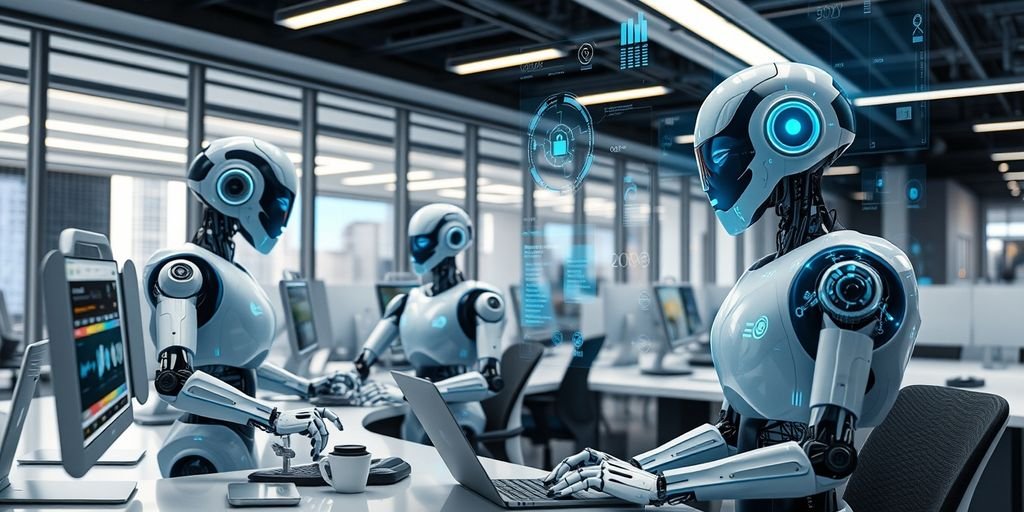AutoGPT is changing the game in the business world. By using advanced AI, it can do tasks on its own, learn as it goes, and fit right into current systems. This article breaks down what AutoGPT can do, how it can help businesses, and what the future might look like. We’ll also look at real-life examples of AutoGPT making a difference in different industries.
Key Takeaways
- AutoGPT can handle tasks without human help, making business processes smoother and faster.
- Businesses can use AutoGPT to improve customer service, manage data better, and take care of routine tasks.
- The future of AutoGPT holds exciting possibilities, but it also brings up questions about jobs and ethics.
The Core Features of AutoGPT
Autonomous Task Execution
AutoGPT stands out due to its ability to perform tasks without human intervention. This autonomous nature allows businesses to streamline operations and reduce the need for constant oversight. By leveraging advanced AI agents, AutoGPT can handle complex tasks, making it a valuable tool for any organization.
Continuous Learning and Adaptation
One of the most impressive features of AutoGPT is its capacity for continuous learning. The system adapts to new information and evolving business needs, ensuring it remains effective over time. This adaptability is crucial for businesses looking to stay competitive in a rapidly changing market.
Integration with Existing Systems
AutoGPT is designed to seamlessly integrate with a company’s existing systems. This compatibility means that businesses can implement AutoGPT without overhauling their current infrastructure. The ease of integration helps in quickly realizing the benefits of autonomous AI agents.
AutoGPT is in its pre-alpha stage, but its potential is already evident. The open-source nature of the project allows for continuous improvement and community-driven innovation.
Implementing AutoGPT in Business Operations
Automating Routine Activities
Integrating AutoGPT into your business can transform how routine tasks are handled. By automating repetitive activities, businesses can save time and reduce errors. For example, AutoGPT can manage scheduling, data entry, and even basic customer interactions, freeing up human resources for more strategic tasks.
Enhancing Customer Service
AutoGPT can significantly improve customer service by providing instant responses to common inquiries. It can handle multiple customer interactions simultaneously, ensuring that no query goes unanswered. This not only enhances customer satisfaction but also allows human agents to focus on more complex issues.
Optimizing Data Analysis
With AutoGPT, businesses can streamline their data analysis processes. The AI can quickly sift through large datasets, identify patterns, and generate insights that would take humans much longer to uncover. This capability is particularly valuable for making data-driven decisions and staying competitive in the market.
Implementing AutoGPT requires careful planning and continuous monitoring to ensure it aligns with business goals and adapts to changing needs.
The Future of Autonomous AI Agents in Business
As we look ahead, autonomous AI agents are set to become even more advanced and essential in business operations. These agents will not only automate complex tasks but also enhance decision-making and bring new levels of efficiency and precision. However, the journey forward is not without its challenges.
Potential Advancements
Autonomous AI agents are expected to evolve rapidly, with improvements in their ability to operate independently and make rational decisions. This progress will bring us closer to achieving Artificial General Intelligence (AGI), unlocking new possibilities for innovation and collaboration between humans and machines.
Impact on Workforce
The rise of autonomous AI agents will significantly impact the workforce. While these agents will automate routine and complex tasks, they will also create new job opportunities that require human oversight and creativity. Trust and training will be crucial in ensuring that employees can work effectively alongside AI agents.
Ethical and Regulatory Considerations
As autonomous AI agents become more prevalent, ethical and regulatory considerations will come to the forefront. Businesses will need to navigate issues related to data privacy, algorithmic bias, and the ethical use of AI. Establishing clear guidelines and regulations will be essential to harnessing the full potential of these technologies while minimizing risks.
Autonomous AI agents are coming to workplaces sooner than you might think. Count on them automating routine and complex tasks, such as personalized customer interactions and data analysis.
Case Studies: Success Stories of AutoGPT in Action
Retail Industry Transformation
In the retail sector, AutoGPT has been a game-changer. Retailers are using AutoGPT to manage inventory and optimize supply chains. This has led to significant cost savings and improved efficiency. For example, a leading global brand recently implemented AutoGPT to streamline its inventory management, resulting in a 20% reduction in stockouts and a 15% increase in overall sales.
Financial Sector Innovations
The financial industry is also reaping the benefits of AutoGPT. Banks and financial institutions are using AutoGPT to process claims and manage customer data. One notable case involved a major bank that used AutoGPT to handle 50 different types of claims records, ranging from auto to home insurance. This not only sped up the claims process but also reduced errors by 30%.
Healthcare Improvements
In healthcare, AutoGPT is assisting in medical diagnosis and patient management. Hospitals are leveraging AutoGPT to analyze patient data and provide more accurate diagnoses. A recent success story involves a hospital that used AutoGPT to assist in diagnosing rare diseases, leading to a 25% increase in diagnostic accuracy.
AutoGPT is not just a tool; it’s a revolution in how industries operate, bringing efficiency and accuracy to new heights.
Conclusion
AutoGPT is changing the game for businesses everywhere. By using smart AI agents that can think and act on their own, companies can save time and work more efficiently. This technology is not just about doing tasks faster; it’s about doing them smarter. As AutoGPT continues to grow, it will open up new ways for businesses to improve and innovate. The future looks bright with AutoGPT leading the way in making business operations smoother and more effective.
Frequently Asked Questions
What is AutoGPT?
AutoGPT is a type of AI that can perform tasks on its own without needing human help. It uses a powerful language model called GPT-4 to think, plan, and act independently.
How can AutoGPT help my business?
AutoGPT can automate everyday tasks, improve customer service, and make data analysis easier. This can save time and increase efficiency in your business.
Are there any concerns with using AutoGPT?
Yes, there are some concerns like how it will affect jobs, ethical issues, and the need for new rules and regulations to manage its use.



